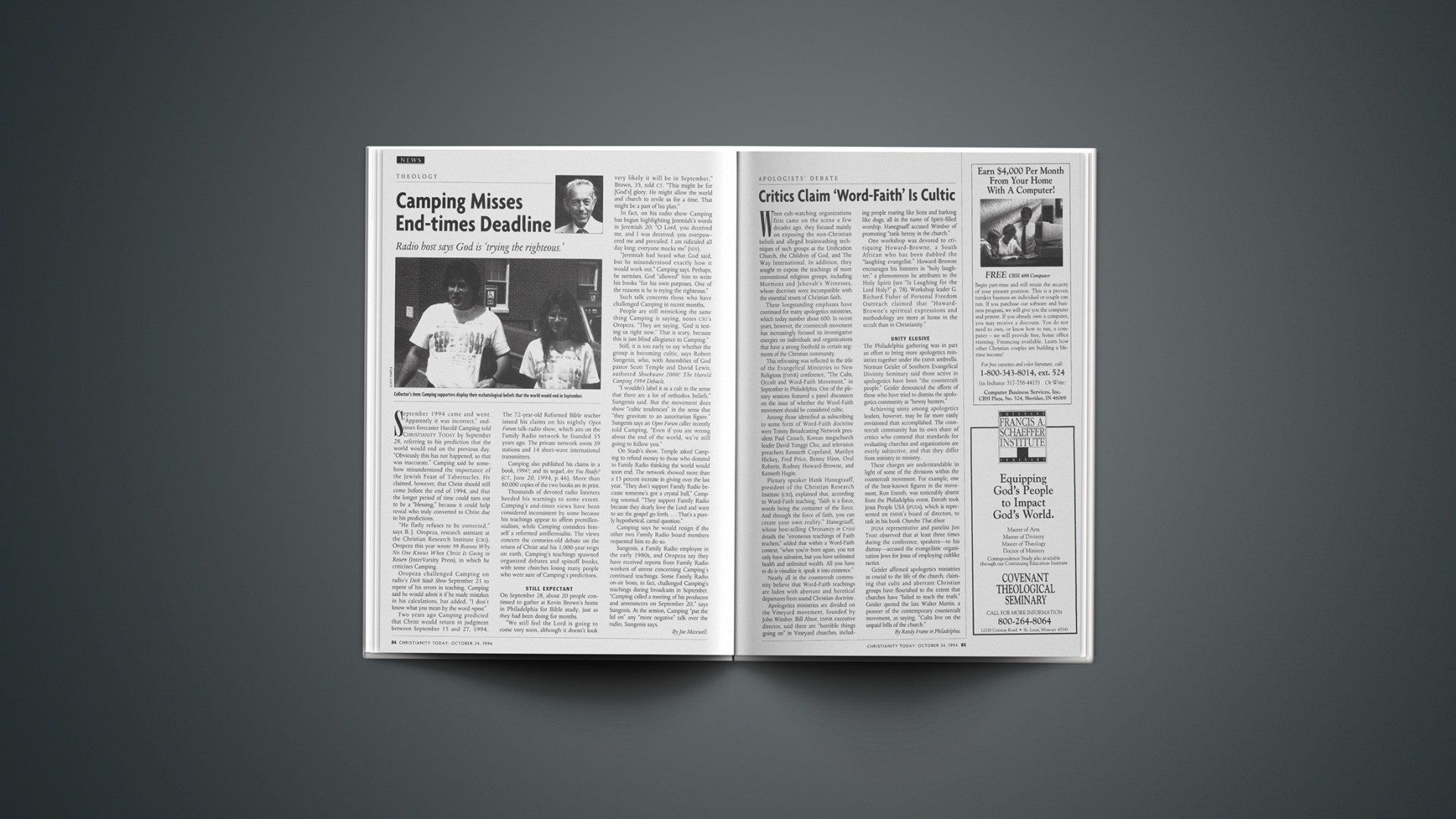When cult-watching organizations first came on the scene a few decades ago, they focused mainly on exposing the non-Christian beliefs and alleged brainwashing techniques of such groups as the Unification Church, the Children of God, and The Way International. In addition, they sought to expose the teachings of more conventional religious groups, including Mormons and Jehovah’s Witnesses, whose doctrines were incompatible with the essential tenets of Christian faith.
These long-standing emphases have continued for many apologetics ministries, which today number about 600. In recent years, however, the countercult movement has increasingly focused its investigative energies on individuals and organizations that have a strong foothold in certain segments of the Christian community.
This refocusing was reflected in the title of the Evangelical Ministries to New Religions (EMNR) conference, “The Cults, Occult and Word-Faith Movement,” in September in Philadelphia. One of the plenary sessions featured a panel discussion on the issue of whether the Word-Faith movement should be considered cultic.
Among those identified as subscribing to some form of Word-Faith doctrine were Trinity Broadcasting Network president Paul Crouch, Korean megachurch leader David Yonggi Cho, and television preachers Kenneth Copeland, Marilyn Hickey, Fred Price, Benny Hinn, Oral Roberts, Rodney Howard-Browne, and Kenneth Hagin.
Plenary speaker Hank Hanegraaff, president of the Christian Research Institute (CRI), explained that, according to Word-Faith teaching, “faith is a force, words being the container of the force. And through the force of faith, you can create your own reality.” Hanegraaff, whose best-selling Christianity in Crisis details the “erroneous teachings of Faith teachers,” added that within a Word-Faith context, “when you’re born again, you not only have salvation, but you have unlimited health and unlimited wealth. All you have to do is visualize it, speak it into existence.”
Nearly all in the countercult community believe that Word-Faith teachings are laden with aberrant and heretical departures from sound Christian doctrine.
Apologetics ministries are divided on the Vineyard movement, founded by John Wimber. Bill Alnor, EMNR executive director, said there are “horrible things going on” in Vineyard churches, including people roaring like lions and barking like dogs, all in the name of Spirit-filled worship. Hanegraaff accused Wimber of promoting “rank heresy in the church.”
One workshop was devoted to critiquing Howard-Browne, a South African who has been dubbed the “laughing evangelist.” Howard-Browne encourages his listeners in “holy laughter,” a phenomenon he attributes to the Holy Spirit (see “Is Laughing for the Lord Holy?”). Workshop leader G. Richard Fisher of Personal Freedom Outreach claimed that “Howard-Browne’s spiritual expressions and methodology are more at home in the occult than in Christianity.”
UNITY ELUSIVE
The Philadelphia gathering was in part an effort to bring more apologetics ministries together under the EMNR umbrella. Norman Geisler of Southern Evangelical Divinity Seminary said those active in apologetics have been “the countercult people.” Geisler denounced the efforts of those who have tried to dismiss the apologetics community as “heresy hunters.”
Achieving unity among apologetics leaders, however, may be far more easily envisioned than accomplished. The countercult community has its own share of critics who contend that standards for evaluating churches and organizations are overly subjective, and that they differ from ministry to ministry.
These charges are understandable in light of some of the divisions within the countercult movement. For example, one of the best-known figures in the movement, Ron Enroth, was noticeably absent from the Philadelphia event. Enroth took Jesus People USA (JPUSA), which is represented on EMNR’s board of directors, to task in his book “Churches That Abuse.”
JPUSA representative and panelist Jon Trott observed that at least three times during the conference, speakers-to his dismay-accused the evangelistic organization Jews for Jesus of employing cultlike tactics.
Geisler affirmed apologetics ministries as crucial to the life of the church, claiming that cults and aberrant Christian groups have flourished to the extent that churches have “failed to teach the truth.” Geisler quoted the late Walter Martin, a pioneer of the contemporary countercult movement, as saying, “Cults live on the unpaid bills of the church.”
Copyright © 1994 Christianity Today. Click for reprint information.










